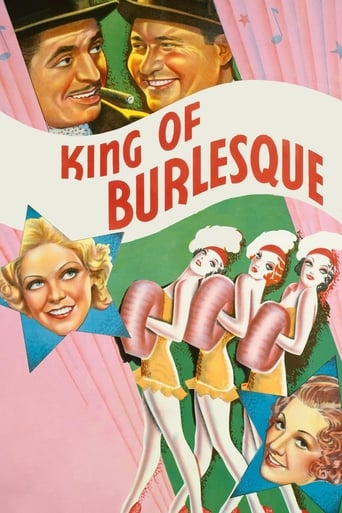MartinHafer
If you've watched many musicals (particularly Fox musicals), then you'll have a strong sense of déjà vu when you watch it. In other words, the script is the exact same script that you've seen before and will see again if you watch any more musicals from this era it's . Without even searching IMDb, I recall having seen the exact same script (with very minor changes) in "Alexander's Ragtime Band". And, considering that Warner Baxter stars in the film, it can be compared in many ways to "42nd Street".Here is the clichéd story outline. Baxter is super-successful at what he does best--Burlesque-inspired musicals for the masses. However, he meets a highbrow society dame and loses his focus--trying to make sophisticated shows instead of his usual fare. Naturally, they flop. In addition, he has another woman who adores him but he just doesn't see it. Late in the film, this woman (Alice Faye) returns and unknown to him finances his comeback. Only then, when he's back on top, does he realize that he's loved her all along--and the film ends with them in the clinch.Unfortunately, this one has relatively bland songs and a terribly muted performance from Baxter. Regardless why, it's just a rather well made but dull musical with nothing distinguished to offer. I did appreciate, however, that the two female dancing leads were a bit chunky--a nice acknowledgment that not all ladies are size 4!
bkoganbing
The title role in King of Burlesque is played by Warner Baxter who is the impresario of burlesque down on East 14 Street and Irving Place. But he aspires to higher things and won't be satisfied until he's a monarch on Broadway. For that he's willing to marry up with Mona Barrie an impoverished society girl and leave the faithful Alice Faye behind. Of course this is not a permanent situation.Probably the biggest fault with King of Burlesque is that Warner Baxter does not come over like the hero/heel that Tyrone Power and later John Payne would be in dealing with Alice Faye. He's just too nice for the role.But the film is a real treat for Alice Faye's legion of fans. She gets to sing I'm Shooting High and Spreading Rhythm Around. And I really did like the number she did with British comic actor Herbert Mundin, I Love To Ride The Horses On The Merry Go Round.Radio singer Kenny Baker gets into this film with Lovely Lady for which I have a Bing Crosby recording. Baker had a nice pleasing tenor voice who made his best mark on radio. Around this time he was a regular on Jack Benny's radio program.And King of Burlesque gives fans of Dixieland jazz a real treat in one of the few film appearances of the legendary pianist Fats Waller. Waller plays an elevator operator who Baxter finally gives a break to in his new show and he plays and sings I've Got My Fingers Crossed.Jimmy McHugh and Ted Koehler did the score for King of Burlesque and the numbers are fine. Elements of the plot were done in Alice Faye's later film, Hello Frisco Hello. That one was better, but this one is not bad other than Baxter's miscasting.
timothymcclenaghan
It seems many other contributing members are hypercritical of older films. Most films made in the 1930s and 1940s weren't meant to be memorable, just enjoyed for a brief time and then to be forgotten. Now television has resurrected them so people can look at them again.This film is typical of the era in which it was made. I did notice that it has some plot devices which re-appear in later 20th Century-Fox films (some of which also featured Alice Faye): The low-class man aspiring to high society and "a dame with class" repeated in "Hello Frisco Hello" and "Nob Hill", and Faye's getting passed up for another woman, then going off to London to be a big success on the stage there. Never let it be said that Darryl Zanuck didn't get mileage out of his story lines.Here we see Faye early in her career as a Jean Harlow knock-off, with platinum blonde hair and pencil-thin eyebrows. Not too long after this film, her appearance was normalized and she began singing in a lower key which made her voice so much richer. I think she was responsible for a whole new trend for female singers. Gone was the high-pitched, nasal sound, popular in the 1920s and early 30s.For fans of tap dancing, you can watch Dixie Dunbar, whose career never amounted to much, and also there is a nice performance by juvenile Gareth Joplin, on a level equal to that of any adult performer, but who evidently did not have much of a film career either.
Kalaman
Fox tries to imitate Warner Bros. in this slow-moving backstage romp that stars Alice Faye, Jack Oakie, and Warner Baxter, and directed by Sidney Lanfield. Baxter is the "King of Burlesque" who moves from a burlesque to a legitimate theatre and marries a socialite played by Mona Barrie. Alice Faye, in the typical role of an aspiring actress, looks appropriate for her part, though her presence struck me as cold and unmemorable, compared to her other Fox musicals. The film comes into full view in the last twenty minutes where we see a dazzling display of production numbers that recall those of Busby Berkeley. The film's choreography and songs were nominated for an Oscar. There is fun and frolic and the best songs/numbers are "Shooting High", "Too Good To Be True", "Whose Big Baby Are You" and "Lovely Lady".


